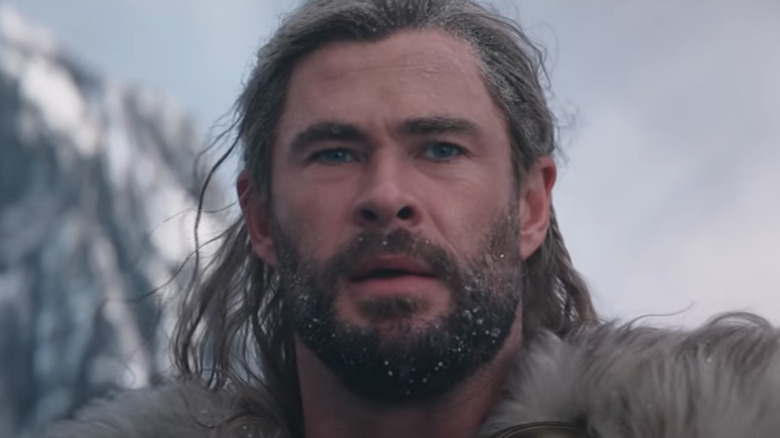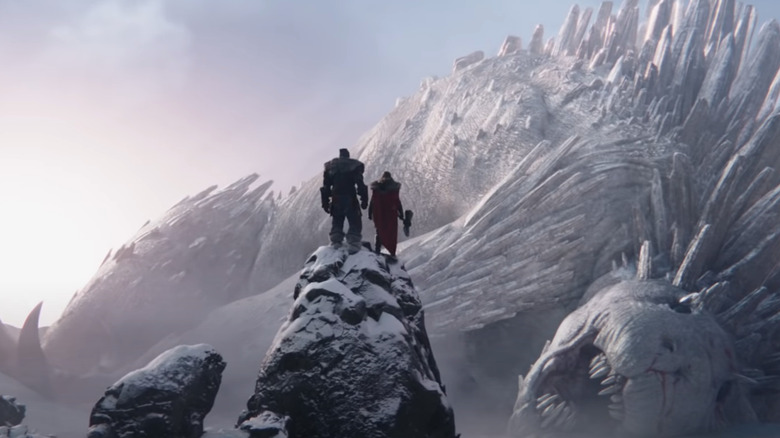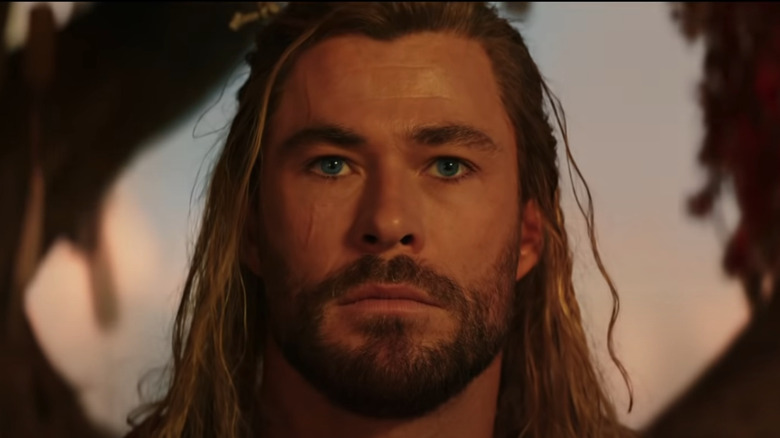Why One Shot From The Thor: Love And Thunder Trailer Has Some Fans Livid
With "Thor: Love and Thunder" slated for a July release weekend, Marvel Studios has given fans their first taste of the highly anticipated movie with an official teaser trailer. With Taika Waititi back in the director's chair, as he was on the previous "Thor: Ragnarok," expectations for the long-awaited film have reached new heights, and the trailer looks to deliver on that hype.
"Thor: Love and Thunder" will pick up at some point after "Avengers: Endgame," with Thor (Chris Hemsworth) taking on Gorr the God Butcher (Christian Bale). The movie will also feature the return of many of the Guardians of the Galaxy, Tessa Thompson as Valkyrie (the king of New Asgard), Taika Waititi as Korg, and Natalie Portman as Jane Foster — now suited up as Mighty Thor.
Like "Ragnarok" before it, "Thor: Love and Thunder" seems to be embracing a hyper-colorful design aesthetic, and the teaser is scored with the song "Sweet Child O' Mine" by Guns N' Roses as viewers are treated to shots of flying longboats and cosmic locations. Though brief, the teaser is packed with fun easter eggs for MCU fans.
However, certain parts of the trailer didn't go down well among comic book fans, who are once again raising concerns around the ethical treatment of artists after spotting a certain shot in the "Thor: Love and Thunder" teaser.
A remake of a panel from the recent Thor comics has fans demanding fair pay
Near the one-minute mark of the newly released official teaser for "Thor: Love and Thunder" there's a shot of what appears to be Thor and Korg standing on top of a mountain peak and looking out over the carcass of an enormous beast. But as eagle-eyed fans were quick to point out, that shot is nearly identical to a panel from writer Jason Aaron and illustrator Esad Ribic's "Thor: God of Thunder" comic book series.
On Twitter, @Creature_SH tweeted both images side by side with the caption, "At this point, it's hard to argue that the artist shouldn't get any royalties, isn't it?" In apparent exasperation, @EthanLikesComix agreed, writing, "it literally doesn't make any sense. these movies are the biggest movies known to man, and they wouldn't even ... exist without these artist [sic]. pay them." Meanwhile, @petervulfranc summed the situation up, writing, "Corporations will stripmine your work, make it gray and lifeless, and give you neither credit nor royalties".
Now, it should be noted that we don't know exactly what compensation is given to comic book artists in cases like this. But the artists who create comics for Marvel Comics have very little legal claim to the work after handing it in, and in general, it seems Marvel Studios can take what they please without providing further compensation to a writer or illustrator whose work ends up replicated by a billion-dollar MCU film. But many argue that just because something is legal doesn't make it ethical.
The use of Aaron and Ribic's work in "Thor: Love and Thunder" is only the latest in a series of controversies that have had people begging Marvel Studios and Disney to fairly compensate the creators whose work they use on the silver screen.
Disney has a long history of not compensating original creators with royalities
While the use of Jason Aaron and Esad Ribic's work on "Thor: Love and Thunder" is brazen, this is far from the first time a Disney franchise has drawn ire for its treatment of writers and artists. Last year, "Hawkeye" comics illustrator David Aja, whose work inspired the Disney+ miniseries of the same title, rallied Marvel fans to his side when he called Marvel and Disney out for omitting his name from the credits and denying him compensation.
And then there's the case of author Alan Dean Foster. In 1976, Foster ghost-wrote a book for George Lucas, titled "Star Wars." He would go on to write tie-in novels for everything from "Alien" to "Star Trek," and he was making a decent income from the continuing royalties on those books. But when Disney acquired 20th Century Fox, he found that royalty payments stopped coming in from his "Alien" novels (via Polygon). More digging revealed that his "Star Wars" checks had halted, too. Foster, a member of the Science Fiction and Fantasy Writers of America (SFWA), brought his complaints to the organization's Grievance Committee. The SFWA contacted the publishers and was told to speak with Disney, who now held rights for the books. Disney, however, refused to pay out the royalties, claiming that they had acquired the rights to Foster's books, but not the responsibility of paying royalties on them as stipulated in Foster's original contract with Warner Books.
After Foster's fight for fair payment became major news in the writing world, other "Star Wars" novelists came forward to announce that their own works had been pilfered for big-budget movies without pay or accreditation, even as their royalty checks vanished. The problem is so widespread that even famed comics writer and novelist Neil Gaiman has spoken out against Disney's Scrooge-like treatment of working artists.


